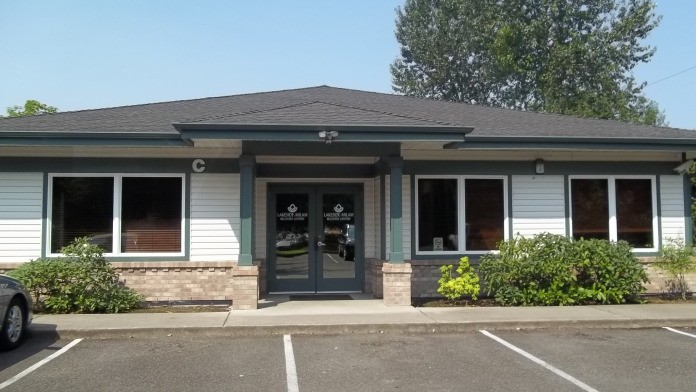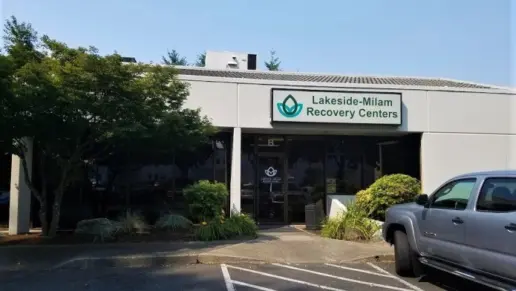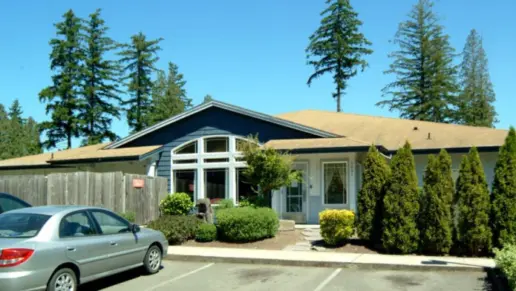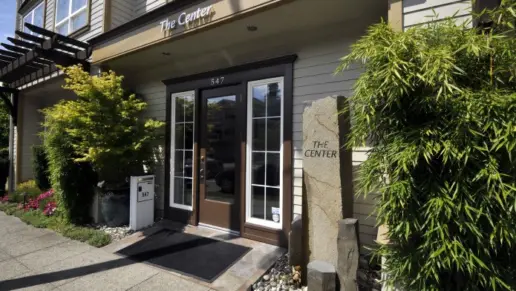I can't say enough things about the quality and care that I received, they provided me with the necessary tools to stay clean, the staff gave me extensive education about addictions and taught me how to cope with my problems. Thanks to the help received here now I have the d ...
About Lakeside Milam Recovery Centers – Outpatient
Lakeside Milam Recovery Centers in Auburn, Washington is a family operated facility that’s provided outpatient drug and alcohol treatment for three decades. Individuals in the King and Pierce County areas can receive outpatient treatment while continuing to manage their daily responsibilities. The facility offers same day assessments to help you get started with your treatment as soon as possible. You’ll also have the convenience of having your treatment sessions occur in the day or evening.
The services featured in LMRC’s outpatient program include the initial assessment, individual counseling, intensive outpatient treatment and continuing care. The assessment will help your clinician determine a customized treatment plan to recommend to you. In individual counseling, the counselor will monitor your progress with your recovery plan and offer you insights to help you maintain your sobriety.
If you’re recommended to the intensive outpatient program then you’ll participate in both individual therapy and group therapy. Clients will also be given ongoing case management services. A case manager will help you get access to the resources you need to support your recovery. After clients complete their intensive outpatient program, they can participate in a continuing care plan that involves relapse education and aftercare recommendations. The facility can help you connect with support groups to have a support network that encourages you in your recovery journey.
Some additional services at the Auburn campus are the family education program, the alcohol and drug information school and the deferred prosecution program. In the family education program, your parents, children or siblings will get an opportunity to discuss the emotions they’ve struggled with and learn about addiction dynamics.
The city of Auburn is just a half hour away from Seattle and a short drive away from Tacoma. There are also numerous state parks nearby such as the Dash Point State Park and the Flaming Geyser State Park.
Rehab Score
Gallery

Location
Accepted Insurance
Other Forms of Payment
Private insurance refers to any kind of healthcare coverage that isn't from the state or federal government. This includes individual and family plans offered by an employer or purchased from the Insurance Marketplace. Every plan will have different requirements and out of pocket costs so be sure to get the full details before you start treatment.
Self-pay involves paying for treatment out of your own pocket. You can use savings or credit, get a personal loan, or receive help from family and friends to fund your treatment. If you don't have insurance or your insurance plan doesn't cover a specific program, self-pay can help ensure you still get the care you need.
Addiction Treatments
Levels of Care
Treatments
The goal of treatment for alcoholism is abstinence. Those with poor social support, poor motivation, or psychiatric disorders tend to relapse within a few years of treatment. For these people, success is measured by longer periods of abstinence, reduced use of alcohol, better health, and improved social functioning. Recovery and Maintenance are usually based on 12 step programs and AA meetings.
Effective drug rehab in Washington integrates care for the whole person, offering comprehensive solutions to addiction. Treatment methods address mental, physical, and relational aspects of substance abuse.
Many of those suffering from addiction also suffer from mental or emotional illnesses like schizophrenia, bipolar disorder, depression, or anxiety disorders. Rehab and other substance abuse facilities treating those with a dual diagnosis or co-occurring disorder administer psychiatric treatment to address the person's mental health issue in addition to drug and alcohol rehabilitation.
Opioid rehabs specialize in supporting those recovering from opioid addiction. They treat those suffering from addiction to illegal opioids like heroin, as well as prescription drugs like oxycodone. These centers typically combine both physical as well as mental and emotional support to help stop addiction. Physical support often includes medical detox and subsequent medical support (including medication), and mental support includes in-depth therapy to address the underlying causes of addiction.
Substance rehabs focus on helping individuals recover from substance abuse, including alcohol and drug addiction (both illegal and prescription drugs). They often include the opportunity to engage in both individual as well as group therapy.
Programs


Clinical Services
Cognitive Behavioral Therapy (CBT) is a therapy modality that focuses on the relationship between one's thoughts, feelings, and behaviors. It is used to establish and allow for healthy responses to thoughts and feelings (instead of unhealthy responses, like using drugs or alcohol). CBT has been proven effective for recovering addicts of all kinds, and is used to strengthen a patient's own self-awareness and ability to self-regulate. CBT allows individuals to monitor their own emotional state, become more adept at communicating with others, and manage stress without needing to engage in substance abuse.
Addiction research has determined that successful treatment of an addicted person ideally includes the education of family members. Just as the disease of addiction causes dysfunctional behaviors in the addict, so too does it have psychological, emotional, and spiritual effects on family members. Family education is a unique program that helps family members understand how they been affected by the disease of addiction and how they can participate in the recovery of their loved one.
Group therapy is any therapeutic work that happens in a group (not one-on-one). There are a number of different group therapy modalities, including support groups, experiential therapy, psycho-education, and more. Group therapy involves treatment as well as processing interaction between group members.
In individual therapy, a patient meets one-on-one with a trained psychologist or counselor. Therapy is a pivotal part of effective substance abuse treatment, as it often covers root causes of addiction, including challenges faced by the patient in their social, family, and work/school life.
Life skills trainings involve all the skills a person must have in order to function successfully in the world. These include time management, career guidance, money management, and effective communication. Truly successful addiction recovery is based on the ability to not only live substance-free, but to thrive. Life skills teaches the practical necessities of functioning in society, which sets clients up for success in life, and therefore sobriety.
Amenities
-
Residential Setting
-
Private Setting
Accreditations

The Commission on Accreditation of Rehabilitation Facilities (CARF) is a non-profit organization that specifically accredits rehab organizations. Founded in 1966, CARF's, mission is to help service providers like rehab facilities maintain high standards of care.
CARF Accreditation: Yes
Contact Information
721 45th Street NE
Suite C
Auburn, WA 98002














